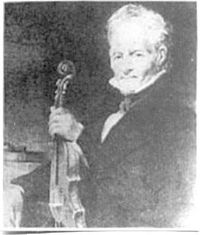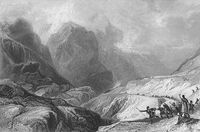Annotation:Massacre of Glencoe (1) (The): Difference between revisions
No edit summary |
m (Text replacement - "garamond, serif" to "sans-serif") |
||
| (3 intermediate revisions by one other user not shown) | |||
| Line 1: | Line 1: | ||
=='''Back to [[{{BASEPAGENAME}}]]'''== | =='''Back to [[{{BASEPAGENAME}}]]'''== | ||
---- | ---- | ||
<p><font face=" | <p><font face="sans-serif" size="4"> | ||
'''MASSACRE OF GLENCOE [1], THE''' (Mort Ghlinne-comhainn). AKA - "The Massacre at Glen Coe." Scottish, Slow Air (6/8 or 3/4 time). G Major. Standard tuning (fiddle). AABB (Fraser). "The poet, in the 'Massacre of Glencoe', as handed by the editor's progenitor, addresses himself to the owl, as the only witness of a deed perpetrated under silence of night, and pretends he is telling from her narration every circumstance of barbarity relating to that melancholy event" [Fraser, 1816]. | '''MASSACRE OF GLENCOE [1], THE''' (Mort Ghlinne-comhainn). AKA - "The Massacre at Glen Coe." Scottish, Slow Air (6/8 or 3/4 time). G Major. Standard tuning (fiddle). AABB (Fraser). "The poet, in the 'Massacre of Glencoe', as handed by the editor's progenitor, addresses himself to the owl, as the only witness of a deed perpetrated under silence of night, and pretends he is telling from her narration every circumstance of barbarity relating to that melancholy event" [Fraser, 1816]. | ||
[[File:simonfraser.jpg|200px|thumb|left|Capt. Simon Fraser]] | [[File:simonfraser.jpg|200px|thumb|left|Capt. Simon Fraser]] | ||
The "deed" or "melancholy event" Fraser refers to is the famous Massacre of Glencoe, which occured in that stark and beautiful valley in the southwestern Highlands just to the south of Fort William on February 13th, 1692. The new English king at the time, William III, had demanded that the clans take an oath of loyalty to him that they would not support the dethroned James II. The MacDonald clan procrastinated in this and in retribution William ordered troops, accompanied by elements of the Campbell clan (traditional enemies of the MacDonalds), to force the issue. The MacDonalds were found encamped or dwelling at Glencoe and were massacred, over forty dying outright and many more dying of exposure after having been driven into the surrounding mountains, or burned in houses by the pursuing troops. The abomination of the event in the minds of the Highlanders, beside the killings, was that the Campbells beforehand had partaken of "the bread and salt" of the MacDonalds for several days, i.e. had been granted and accepted formal hospitality and were considered guests. Glencoe has been ever after known as "The Glen of Weeping" and has served as a focal point of Scottish antipathy toward England. | The "deed" or "melancholy event" Capt. Simon Fraser (1773 - 1852), Knockie, Inverness-shire, refers to is the famous Massacre of Glencoe [http://en.wikipedia.org/wiki/Massacre_of_Glencoe], which occured in that stark and beautiful valley in the southwestern Highlands just to the south of Fort William on February 13th, 1692. The new English king at the time, William III, had demanded that the clans take an oath of loyalty to him that they would not support the dethroned James II. The MacDonald clan procrastinated in this and in retribution William ordered troops, accompanied by elements of the Campbell clan (traditional enemies of the MacDonalds), to force the issue. The MacDonalds were found encamped or dwelling at Glencoe and were massacred, over forty dying outright and many more dying of exposure after having been driven into the surrounding mountains, or burned in houses by the pursuing troops. The abomination of the event in the minds of the Highlanders, beside the killings, was that the Campbells beforehand had partaken of "the bread and salt" of the MacDonalds for several days, i.e. had been granted and accepted formal hospitality and were considered guests. Glencoe has been ever after known as "The Glen of Weeping" and has served as a focal point of Scottish antipathy toward England. [[File:Glencoemassacre.jpg|200px|thumb|right|Glencoe]] | ||
<br> | <br> | ||
<br> | <br> | ||
| Line 11: | Line 11: | ||
<br> | <br> | ||
</font></p> | </font></p> | ||
<p><font face=" | <p><font face="sans-serif" size="4"> | ||
''Source for notated version'': | ''Source for notated version'': | ||
<br> | <br> | ||
<br> | <br> | ||
</font></p> | </font></p> | ||
<p><font face=" | <p><font face="sans-serif" size="4"> | ||
''Printed sources'': Fraser ('''The Airs and Melodies Peculiar to the Highlands of Scotland and the Isles'''), 1816; No. 57, p. 20. | ''Printed sources'': Fraser ('''The Airs and Melodies Peculiar to the Highlands of Scotland and the Isles'''), 1816; No. 57, p. 20. | ||
| Line 22: | Line 22: | ||
<br> | <br> | ||
</font></p> | </font></p> | ||
<p><font face=" | <p><font face="sans-serif" size="4"> | ||
''Recorded sources'': <font color=teal></font> | ''Recorded sources'': <font color=teal></font> | ||
</font></p> | </font></p> | ||
Latest revision as of 14:20, 6 May 2019
Back to Massacre of Glencoe (1) (The)
MASSACRE OF GLENCOE [1], THE (Mort Ghlinne-comhainn). AKA - "The Massacre at Glen Coe." Scottish, Slow Air (6/8 or 3/4 time). G Major. Standard tuning (fiddle). AABB (Fraser). "The poet, in the 'Massacre of Glencoe', as handed by the editor's progenitor, addresses himself to the owl, as the only witness of a deed perpetrated under silence of night, and pretends he is telling from her narration every circumstance of barbarity relating to that melancholy event" [Fraser, 1816].

The "deed" or "melancholy event" Capt. Simon Fraser (1773 - 1852), Knockie, Inverness-shire, refers to is the famous Massacre of Glencoe [1], which occured in that stark and beautiful valley in the southwestern Highlands just to the south of Fort William on February 13th, 1692. The new English king at the time, William III, had demanded that the clans take an oath of loyalty to him that they would not support the dethroned James II. The MacDonald clan procrastinated in this and in retribution William ordered troops, accompanied by elements of the Campbell clan (traditional enemies of the MacDonalds), to force the issue. The MacDonalds were found encamped or dwelling at Glencoe and were massacred, over forty dying outright and many more dying of exposure after having been driven into the surrounding mountains, or burned in houses by the pursuing troops. The abomination of the event in the minds of the Highlanders, beside the killings, was that the Campbells beforehand had partaken of "the bread and salt" of the MacDonalds for several days, i.e. had been granted and accepted formal hospitality and were considered guests. Glencoe has been ever after known as "The Glen of Weeping" and has served as a focal point of Scottish antipathy toward England.

It has been reported that there was still some vestige of distrust between Campbells and MacDonalds on Cape Breton Island as late as the early 20th century.
Source for notated version:
Printed sources: Fraser (The Airs and Melodies Peculiar to the Highlands of Scotland and the Isles), 1816; No. 57, p. 20.
Recorded sources:
